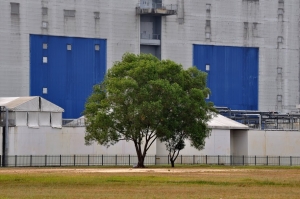It's a scenario that may one day not only overcome temporary power interruptions, but manage our dwindling energy supplies and reduce greenhouse gas emissions throughout the industrialised world.
Joint Research and Development links between Australia's La Trobe University and Indian electric vehicle manufacturer Mahindra Reva – one of the first companies to introduce electric vehicles worldwide – are now working to turn that goal into global reality.
The project, one of two new La Trobe R&D links with India, was announced recently by Premier Ted Baillieu while leading a Victorian trade mission to India.
La Trobe University Vice-Chancellor, Professor John Dewar, who is accompanying the Premier, said the advanced energy management system will be developed and trialled by Mahindra Reva at its new electric vehicle plant in Bangalore.
The plant's power supply includes solar panels with a back-up diesel generator, which the company would eventually like to replace by "harvesting" energy from hundreds of company and employees cars in their car park.
The project is based on cutting-edge Information and Communications Technology (ICT) developed by La Trobe's Centre for Technology Infusion and trialled in buildings on the Melbourne campus since 2008.
The La Trobe system is already used for domestic applications following its successful installation by the University, CSIRO and commercial builders in Australia's first Zero Emission House last year.
Among other features, it enables electric vehicles to be plugged into the home grid, drawing down car battery power, for example during the evening peak, and then, overnight when power is cheaper, recharging the car's battery for the morning.
Second agreement in three days
A second La Trobe University R&D agreement in India, involving collaboration with leading multinational company, HCL Technologies, on research and development of Intelligent Transport Systems, was signed on Tuesday, 21 February, 2010.
Deputy Vice-Chancellor (Research), Professor Tim Brown, said the HCL transport project was based on technology now being trialled in Victoria, part of a $5.5m rail crossing safety project involving 100 vehicles fitted with special wireless communications systems.
Senior Deputy Vice-Chancellor Professor John Rosenberg, who is in India with Vice-Chancellor Dewar, said both projects were exciting developments for Victoria's research and high-tech development sector in general, and the university in particular, by recognising La Trobe's key role in such leading-edge ICT research.
"They are based on systems developed by staff and higher degree students at La Trobe's Centre for Technology Infusion led by Professor Jugdutt (Jack) Singh on our Melbourne campus," Rosenberg said.
Victorian Minister for Technology, Gordon Rich-Phillips, welcomed the signing of the MoUs and said the collaboration was important in bringing together academia and industry.
He said Victoria's ICT industry, generating around $29 billion in revenue and $2.45 billion in exports annually, leads the way as an internationally competitive source of innovative products and services, and provides many opportunities for partnerships and investment.
While in India, La Trobe University also signed a higher education exchange and co-operation agreement for research and teaching with the Birla Institute of Technology and Science, in Pilani, Rajasthan.






-160x160-state_article-rel-cat.png)








-160x160-state_article-rel-cat.png)


-160x160-state_article-rel-cat.png)








